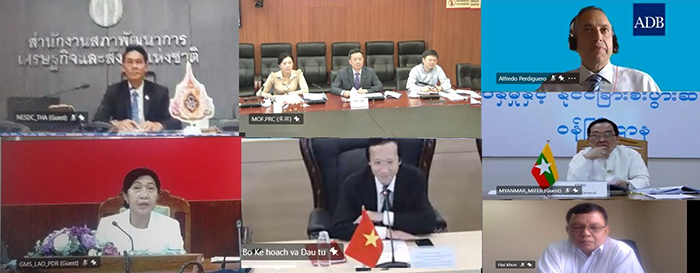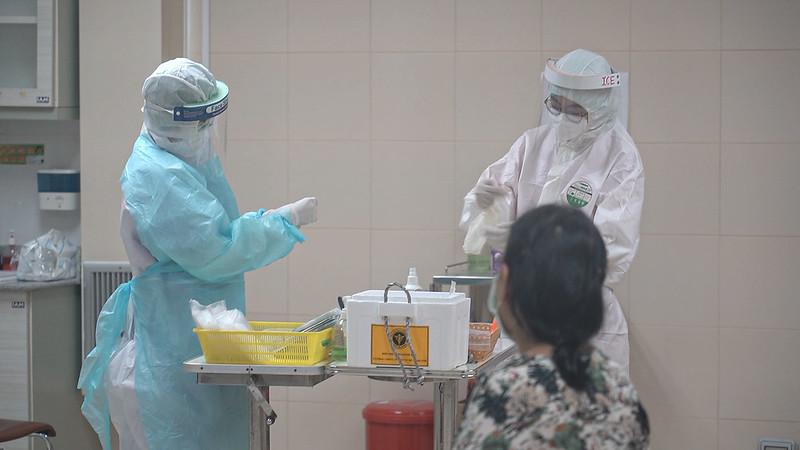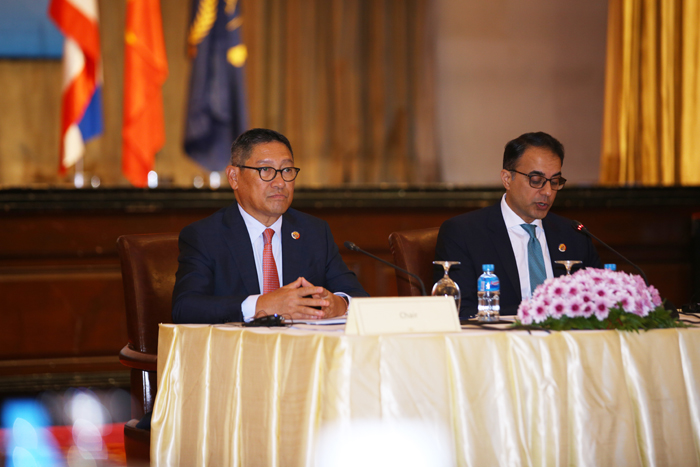Call for Proposals: Submit Applications for Pilot Demonstrations under the GMS Climate Change and Environmental Sustainability Program
The program is now accepting demonstration applications for five of its six priority themes:
GMS 2030 Strategic Framework for Accelerating Climate Action and Environmental Sustainability
This Framework aims to prioritize actions to accelerate implementation of selected GMS-wide interventions towards meeting the national and international commitments on climate resilience, greenhouse gas mitigation, biodiversity conservation, and environmental sustainability. This was endorsed at the EMM-6 and approved for notation at the 8th GMS Summit.
Phnom Penh Joint Statement on Prevention of Plastic Pollution in the GMS
Endorsed at the EMM-6, this joint statement represents the commitment of GMS member countries to address the ecological, economic, and societal challenges posed by plastic waste in the subregion.
6th GMS Environment Ministers’ Meeting
The 6th GMS Environment Ministers’ Meeting (EMM-6) was held on 13 September 2024 in Phnom Penh, Cambodia. View the agenda and other related documents.
In the Greater Mekong Subregion, 200 million people in rural areas depend on their surrounding environment for food, water, energy, and income. Forests, wetlands, mangroves, farmlands, and other ecosystems account for between 20% and 55% of the subregion's wealth.
The Working Group on Environment (WGE) provides overall leadership and direction for the subregion's Core Environment Program.
Natural ecosystems – and the food, water, energy, and other vital elements they provide – lie at the heart of the development of the Greater Mekong Subregion. How these natural resources are protected, managed, and enhanced will determine the long-term sustainability of its environment and economic development.
Overexploitation of natural resources, pollution, vulnerability to climate change, and ever-increasing natural disasters are threatening these ecosystems. In addition, environmental degradation is posing risks to sustained long-term growth, and could cost a whopping $55 billion in foregone services over the next 25 years if left unchecked.
Unless there is better planning and management, the subregion’s resource-intensive development approach could lead to food shortages, price shocks, health hazards, and environmental damage that impact thousands of families and put businesses at risk.
The GMS Economic Cooperation Program Strategic Framework 2030 (GMS-2030) will focus on improving environmental sustainability and climate change resilience in the subregion. Environment and climate change challenges will be addressed through green technologies; protection of ecosystems and key ecological processes; climate resilience policies; and disaster-risk management, all of which will recognize the essential role that communities play as stewards of natural resources. A systematic effort will be made to mainstream climate change considerations into all GMS interventions, with a focus on energy efficiency, renewable energy, climate-smart landscapes, and sustainable waste management, particularly in terms of healthy ocean and river systems, and the tackling of plastic pollution. GMS-2030 was endorsed and adopted at the 7th GMS Summit of Leaders in September 2021. It aims to provide a new setting for the development of this subregion for the next decade.
The Core Environment Program Strategic Framework and Action Plan 2018-2022 was endorsed by GMS ministers at the 5th GMS Environment Ministers' Meeting in Chiang Mai, Thailand, held on 30 January – 1 February 2018. The 5-year environment strategy focuses on green technologies and sustainable infrastructure, natural resources and ecosystem services, and climate resilience and disaster risk management.
The GMS Climate Change and Environmental Sustainability Program (GMS CCESP), the third and current phase of the GMS Core Environment Program, supports environmental cooperation and green investments in the GMS. It covers six priority themes that were identified during the 24th Annual Meeting of the GMS WGE in 2019: (a) building climate and disaster resilience; (b) facilitating low carbon transitions; (c) promoting climate-smart landscapes; (d) enhancing environmental quality through pollution control and sustainable waste management; (e) deploying digital technologies for climate actions and environmental sustainability; and (f) financing low-carbon and climate-resilient infrastructure and technologies, including demonstrating climate and disaster risk financing instruments. The GMS CCESP builds on the achievements and lessons from the first two phases of the GMS Core Environment Program, and runs until 2025.
The GMS Core Environment Program was designed to help countries in the GMS meet the increasing demand for food, energy, water, and other natural resources, while at the same time ensuring that resources are available for future generations. This included balancing rapid growth with sustainable practices, and protecting vital water resources, controlling floods, preserving biodiversity and critical ecosystems, and mitigating the impacts of urban expansion.
Related
• GMS Core Environment Program website
• Greater Mekong Subregion Climate Change and Environmental Sustainability Program (Brochure)
Contact Persons
Focal Persons at the Asian Development Bank
Srinivasan Ancha
Climate Change, Resilience, and Environment Cluster
Climate Change and Sustainable Development Department
Mark Bezuijen
Agriculture, Food, Nature, and Rural Development Sector Office
Sectors Group
Other Concerned Staff & Consultants
Alvin Lopez
Agriculture, Food, Nature, and Rural Development Sector Office
Sectors Group
Renalyn Asuncion Padilla
Agriculture, Food, Nature, and Rural Development Sector Office
Sectors Group
Asadullah Sumbal
Regional Cooperation and Integration Unit
Southeast Asia Department
Rafaelita Jamon
Regional Cooperation and Integration Unit
Southeast Asia Department/GMS Secretariat
Send inquiries to GMS SAFSP Secretariat and GMS Secretariat.
The program is now accepting demonstration applications for five of its six priority themes:
The 26th GMS WGE Annual Meeting will discuss key challenges and possible solutions for the region in the light of the UN Biodiversity Conference (COP15) and the UN Climate Change Conference (COP26) and in preparation on their pathway to the upcoming COP27 and COP15 in 2022.

Top row, left to right: Dr. Danucha Pichayanan, Deputy Secretary General, Office of the National Economic and Social Development Council (Thailand); Mr. Liu Weihua, Deputy Director General, Department of International Economic and Financial Cooperation, Ministry of Finance (PRC); Mr. Alfredo Perdiguero, Director, SERC, ADB. Middle row: Mr. Than Aung Kyaw, Director General, FERD, Ministry of Investment and Foreign Economic Relations (Myanmar). Bottom row, left to right: Ms. Sisomboun Ounavong, Director General, Department of International Cooperation, Ministry of Planning and Investment (Lao PDR); Dr. Pham Hoang Mai, Director General, Foreign Economic Relations Department, Ministry of Planning and Investment (Viet Nam); and H.E. Mr. Ros Seilava, Secretary of State, Ministry of Economy and Finance (Cambodia)
A GMS Senior Officials Meeting (SOM) was held on 11 September 2020 via web-based conferencing to review (i) proposed key GMS strategic planning documents and knowledge products, which includes GMS COVID-19 response initiatives and the new long-term strategy for the GMS program, and (ii) preparations for upcoming GMS events—the 11th Economic Corridors Forum (ECF-11), the 24th GMS Ministerial Conference (MC-24), and the 7th GMS Summit (Summit-7).

Scenes of healthcare workers at Thailand Bamrasnaradura Infectious Disease Institute, Ministry of Public Health. Photo: UN Women/ Flickr (CC BY-NC-ND 2.0)
Senior officials of the Greater Mekong Subregion (GMS) met to discuss responses to the coronavirus disease (COVID-19) in the GMS, focusing on regional approaches to promote recovery and resilience. The meeting was held via videoconferencing on 2 June 2020, with participation from all GMS countries and the Asian Development Bank (ADB).

Seated from left: Mr. Sok Chenda Sophea, Minister attached to the Prime Minister, Minister in charge of GMS Cooperation Program/GMS Minister, Secretary General, Council for the Development of Cambodia, and Mr. Ahmed M. Saeed, Vice President for ADB Operations in the Southeast Asia Department, the East Asia Department, and the Pacific Department at the 23rd GMS Ministerial Conference. Photo by ADB.
The Asian Development Bank (ADB) remains committed to supporting the future initiatives of the Greater Mekong Subregion (GMS) Program. Mr. Ahmed M. Saeed, Vice President of ADB, reaffirmed ADB’s support in his speech at the recently-concluded 23rd GMS Ministerial Conference (MC-23). The MC-23 was Mr.